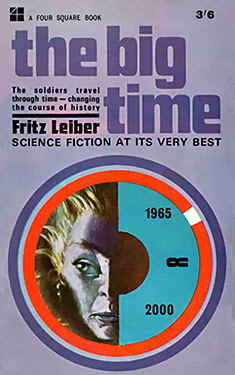GMRC Review: The Big Time by Fritz Leiber
 Jeremy Frantz (jfrantz) joined WWEnd at the beginning of Febuary and has quickly caught up on the Grand Master Reading Challenge. Jeremy reviews SF/F books on his blog The Hugo Endurance Project where he has given himself just 64 weeks to read every Hugo Award winner.
Jeremy Frantz (jfrantz) joined WWEnd at the beginning of Febuary and has quickly caught up on the Grand Master Reading Challenge. Jeremy reviews SF/F books on his blog The Hugo Endurance Project where he has given himself just 64 weeks to read every Hugo Award winner.
The Big Time by Fritz Leiber
Illustrated by Virgil Finlay
Published in 1958 in Galaxy Science Fiction
96 pages
Try as I might, I was not able to keep my reflections from spoiling some parts of the ending so I apologize in advance.
The Surface
Earlier this week I wrote on my blog, The Hugo Endurance Project, that the one of biggest obstacles to the popularity of Science Fiction literature is that, I think, people focus on what is right on the surface and miss everything that is actually interesting about science fiction. The Big Time is a great example of how this can happen.
This short and fast-paced novel begins in the middle of the “Change War,” in which two opposing factions, the Spiders and the Snakes have been at war throughout space and time. The Big Time is a lot like a locked-door mystery and is set in “The Place,” a kind of entertainment and rest area for soldiers who travel throughout billions of years of history (they call this being a part of The Big Time) on the “change winds.”
The main character, Greta (“29 and a party girl”), was one of a number of entertainers at The Place and she begins the story exuberant, playful and confident. Entertainers were, in my mind, somewhere between Geisha and nurse and they served to occupy the time of the change warriors in whatever way necessary. I immediately liked her casual and care free tone. Also she was 29 and a party girl. What’s not to like about that?
Many reviews (recent reviews anyway) get stuck on discussing whether this book was written more like a novel or a play, whether there was any character development or how Leiber’s notion of time travel was so different than most. While those are worthwhile discussions, I think the absurdist elements mentioned in Ted Gioia’s review are what made this book great, even when they’re rather heavy-handed.
The Conservation of Reality
The book really starts to come together with the Law of the Conservation of Reality. In the Change War, soldiers travelling on the change winds fight in real-time (The Small Time) wars for whatever cause is deemed important enough to influence, or else parallel to those wars, against other time travelers. Sometimes events are changed and people might die in their own time.
The effect of the Law of the Conservation of Reality is that history will make as few adjustments as possible to maintain equilibrium, and historical events rarely notice the death of single person or the alteration of some previously significant event. Though history resists change, if a person whose life or experiences are changed in Small Time, is eventually “resurrected” into The Big Time, their memories of their Small Time life or their attitudes will imperceptibly change. I was instantly hooked when Greta mused,
But sometimes I wonder if our memories are as good as we think they are and if the whole past wasn’t once entirely different from anything we remember, and we’ve forgotten that we forgot. – Chapter 3
Because Greta was an entertainer, permanently stationed in The Place, she was not aware of the events in the Change War and experiences these changes completely unguarded. What could be more devastating than to constantly feel that the events in your life were meaningless, not only to the ebb and flow of history, but to your own continued existence? For anyone trying to argue that there was no character development, you might notice that this marked the beginning of a rapid spiral into near perpetual existential crisis that dominated nearly the rest of the book.
“Voulez-vous vivre mademoiselle?”
At a younger age, I came to similar conclusions about existentialism and absurdism on my own without knowing it, completely by chance and without guidance, and it was terribly difficult. Once I started studying philosophy in college, I began to understand that this could be a position of power and as Camus believed, of freedom, instead of the crushing depression I experienced. I don’t believe The Big Time is this optimistic and if you can’t tell by now, I absolutely love a plot that deals in debilitating misery.
 After the door to the Void was sealed shut and the maintainer of the Place (the devise that allowed them to stay connected to the outside world) was introverted, another inhabitant of the Place tells a long-winded (for this book anyway) story about how when she passed from Small Time to The Big Time, she did not want to go on living. After meeting her sweetheart in The Big Time though, she realized that her life had new meaning and encouraged the rest of the group to see things her way. She was almost categorically dismissed. Not even given a second thought. If you like sentimental love stories, this book will ruin you.
After the door to the Void was sealed shut and the maintainer of the Place (the devise that allowed them to stay connected to the outside world) was introverted, another inhabitant of the Place tells a long-winded (for this book anyway) story about how when she passed from Small Time to The Big Time, she did not want to go on living. After meeting her sweetheart in The Big Time though, she realized that her life had new meaning and encouraged the rest of the group to see things her way. She was almost categorically dismissed. Not even given a second thought. If you like sentimental love stories, this book will ruin you.
The collective mood of the group was declining and everyone was trying to make sense of what they’d been though. Greta was hoping for an easy answer, but knew it wasn’t there when she said,
It would be a wonderful philosophy to stand against the change winds. Also damn silly. I wondered if Mark really believed it. I wished I could. – Chapter 16
Greta knows that it is difficult “to love through it,” but she has no other alternative. I really felt her frustration. The idea of finding a way to cope with the proposition that the world does not love you can be soul crushing. I’ve been there. Near the end of the book, I was really worried that Greta wouldn’t be able to stand up to it for long and I imagined that she was on her way to debilitating depression. She’d lost faith in the leadership of both sides, didn’t understand the reason for the Change War any longer, began to think The Place was hell and felt her life was gradually losing meaning. And then it ends. It was a bit like the ending of the Sopranos. I Loved it.
You may not find Leiber’s answer satisfying, but you have to appreciate it when a story is crafted such that you really experience that misery as your own.
Recommendation
This book is much heavier than other reviews would have you believe. Indeed, I’m glad I finished early this week so that I could take a couple days to keeping running through this one. I have to say, its holding up to the scrutiny of time. This is what makes science fiction great. It’s excruciating and horrifying and fabulous.
As much as I enjoyed the spiraling misery, I don’t think I would really recommend this book to anyone who doesn’t have more than a passing interest in religion or philosophy. Needless to say, this book resonated with me, but it doesn’t have much mass appeal so approach this one with caution. While the style is very different, if you are the kind of person who enjoys Sartre and Camus, you probably will like this one.



















 Full Details
Full Details



4 Comments
Thanks for an excellent review. Sadly, try as I might, I cannot bring myself to like this novel, despite its purported Shakespearean influences. The only thing that worked for me is the single location of the setting. The writing style is somewhat childish (I wish I could say "minimalistic"), the dialogue arduous and the science implausible. I can’t imagine a more irritable character in SF than the ingratiating Greta. I accept the fact that during the pulp era SF was less concerned with literary value and more with creating a sense of wonder. I do recognize it’s place in the SF canon, perhaps the avant-garde for alternate history and certainly for raising issues when people mess with time. I am glad to have read it, but won’t recommend it to anyone other than to those who have "Hugo Reading Projects"or GMRC’s on the go. And I’m a huge fan of Camus *smiley* Hat tip, Jeremy, for highlighting a "lesser" work!
Thanks, Jeremy. I just read your review of The Demolished Man, as well, and both give us really interesting takes on these novels. I read The Big Time many years ago, and don’t have a strong memory of it, but the contrast between this review and Emil’s response makes me curious to see what I’d think now…
I feel I need to clarify my response a little further, particularly the part where I refer to the novel as a "lesser" work. I’m sure that many readers will enjoy it, much like Jeremy did. My inference is really that in the context of the Hugo award, the book is arguably one of the weaker winners. By no means do I wish to imply that it is totally atrocious. Jeremy’s notes has certainly opened up a few different angles from which to approach the novel for a second reading.
Emil – It is funny because I find myself agreeing and disagreeing with you simultaneously. I have been reading through the Hugos semi-chronologically and I am still in the 50’s so I can’t really speak to how comparatively worthwhile The Big Time will but comparing it to any of the other Science Fiction I’ve read, I’d tend to agree that this novel probably doesn’t deserve any more veneration than it has already received. After the first few chapters I was a little worried how it would turn out and I’ll also admit that it never really developed into as satisfying a book as being a Hugo winner would suggest it should. That being said, I do think that it had quite enough philosophical weight to merit a position of honor (which is not to say it was necessarily the best that year had to offer, but I can’t really speak to that).Regarding the dialogue, it hadn’t even crossed my mind that it might be thought of that way, but I can definitely understand. Personally I thought Leiber’s writing style was quite an effective (and necessary) escape from the grotesquely depressing themes I outlined. The Place was an escape from the overwhelming and seemingly unending Change War and I completely bought that some of the characters, especially Greta, might be overly light-hearted or maybe somewhat obsequious. It was her job to please, but she was also the character who saves the day so I think there was probably more to Greta than it may have seemed and she at least deserves some credit. I also really dug the multi-lingual dialogue.Anyway, I might disagree but I don’t really think you’re terribly off the mark either. Thanks for adding you perspective.
Sorry, the comment form is closed at this time.